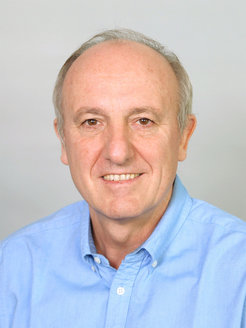Wir begrüßen unser neues externes wissenschaftliches Mitglied: Daniel Loss
Wir freuen uns, Ihnen mitteilen zu können, dass Prof. Dr. Daniel Loss vom Departement Physik der Universität Basel und dem Swiss Nanoscience Institute als neues auswärtiges wissenschaftliches Mitglied in unser Institut berufen wurde.
"Ich freue mich sehr, dem MPI Halle als externes wissenschaftliches Mitglied beizutreten. Es ist nicht nur eine außerordentliche Ehre für mich, Mitglied der Max-Planck-Gesellschaft, einer der renommiertesten Gelehrtengesellschaften weltweit, zu werden, sondern auch eine großartige Gelegenheit, meine Forschung an einem so herausragenden Institut fortzusetzen. Ich bin auch Prof. Stuart Parkin sehr dankbar, dass er dies möglich gemacht hat. Mein Ziel ist es, die enge Zusammenarbeit mit Stuart und seiner Gruppe zu vertiefen und eine wirklich einzigartige Umgebung der engen Zusammenarbeit zwischen Experiment und Theorie zu schaffen. Es gibt keinen besseren Weg, um neue Wege in der Physik der kondensierten Materie zu entdecken und zu begehen, und genau das haben wir vor, indem wir den topologischen Quantenmagnetismus und das Quantencomputing zusammenbringen, nicht nur in der Theorie, sondern auch im Experiment."
Lebenslauf und Forschungsschwerpunkt (in Englisch)

Daniel Loss is one of the leading quantum condensed matter theorists worldwide, with pioneering contributions covering many topics, ranging from very foundational to very applied. He received his PhD in 1985 from the University of Zurich and worked as a postdoctoral fellow with Nobel Laureate, Prof. A. J. Leggett, in Urbana, for two years, before joining IBM Yorktown in 1991. In 1993 he became assistant and then associate professor at SFU in Vancouver and in 1996 he returned to Switzerland to become Ordinarius for Theoretical Physics at the University of Basel, the oldest University in Switzerland and home to Euler and the Bernoulli family. There he established a center for quantum science and quantum computing, attracting outstanding talents from all over. Loss has not only extended boundaries in many areas of condensed matter but also created new branches of physics. In a visionary publication in 1998, Loss (with D. DiVincenzo) invented the concept of a spin quantum computer. The contributions by Loss have created a new research field, establishing him as the founding father of spin qubits.
Over more than thirty years, Loss has continuously delivered groundbreaking work, leading the field of solid-state quantum information. His group pioneered the field further by applying the spin qubit concept to other materials such as carbon nanotubes, graphene, semiconducting nanowires, topological insulators, silicon FinFETs, and molecular magnets. Loss (with J. Klinovaja) made seminal contributions also to topological qubits such as Majorana- and Parafermions, with a series of original proposals that are being implemented in ‘super-semiconducting’ nanosystems worldwide. He also made seminal contributions to the field of quantum effects in spintronics and magnetic systems and, specifically, to magnonics, where he introduced the concept of transport for magnons and spinons in low-dimensional spin systems in a truly visionary work in 2003. This work not only showed that magnon transport can be quantized in units of mB2/h (as instead of e2/h for electrons) but also laid the foundation for the magnonic Hall effect, far ahead of its time. Loss and collaborators pioneered in recent years the field of topological effects in magnetic systems, introducing the concept of topology for magnon bands, characterized by Chern numbers and magnonic chiral edge states. They proposed platforms for topology such as skyrmion crystals formed in magnetic insulators and discovered that they also allow higher order topology with hinge and magnonic corner states, being associated with fractional skyrmions.
Loss’s work has attracted extraordinary attention worldwide over many years, his standing in the international community and the appreciation of his work is also reflected by more than 500 invited talks at international conferences and a publication record with more than 500 papers, obtaining over 52’000 citations and an h-index of over 100 on Google Scholar. In 2005 Loss was awarded the Humboldt Research Prize and in 2010 the Marcel Benoist Prize, the highest scientific honour in Switzerland, endowed by the Swiss Government, for his work on solid-state quantum information science. In 2014, he received the Blaise Pascal Medal in Physics from the European Academy of Sciences, in 2014 he was elected as member of the German Academy of Sciences Leopoldina, and in 2017 he was awarded the King Faisal International Prize in Science, together with L. Molenkamp. This prize was awarded to them for pioneering quantum spintronics. Since 2012 Loss holds an honorary position at CEMS Riken, Japan












